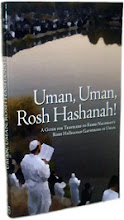
From “Breslov Eikh sheHu: Breslov Customs and Practices, Past and Present.”
Breslover Chassidim in Uman used a combination of apples, pears, nuts, and wine for charoses. This is the common Russian-Ukrainian custom (although some omit pears). However, Reb Gedaliah, who was born and raised in Yerushalayim, used a combination of fruits and spices.
(See Sha’ar haKavannos, Drushei Pesach, Drush 6, end, where Rabbi Shmuel Vital mentions that this is the minhag Ashkenaz. A mnemonic device for this is the word “even”: eppel-barren-nussen / apples, pears, nuts. Rabbi Meir Poppers notes that this does not reflect the kabbalistic custom. However, the Arizal used seven fruits and three spices: grapes, figs, pomegranates, dates, walnuts, apples, and pears, spiced with spikenard, ginger, and cinnamon. Rabbi Shmuel Vital adds that he saw his father Rabbi Chaim pound these ingredients and knead them with wine specifically, and not with vinegar. Ben Ish Chai, Halakhos II, Mishpatim 19, and Akim Es Yitzchak, 25, state that in Baghdad the minhag was to use date honey with nuts. In many parts of Europe, only apples, nuts, and wine were used; e.g. Erkhei Yehoshua [Manistritch], Perach Shoshanim 121. Similarly, minhagei Skver-Chernobyl, Chabad, etc.)
*
Reb Gedaliah used to save a pomegranate from the Sukkah decorations in the refrigerator until Pesach, in order to use it in the charoses.
(Heard from Rabbi Ephraim Kenig)
*
In addition, he used a combination of almonds, walnuts, apples, pears (if available), dates, cinnamon, and ginger. He did not use figs.
(Heard from Rabbi Elazar Kenig)
*
The omission of figs seems to have been due to a question about their kashrus at that time.
(Heard from Rabbi Yosef Sofer, citing his mother, Mrs. Mirel Sofer)
*
Mrs. Sofer and Mrs. Tukatzinsky (both daughters of Reb Gedaliah) also remembered that their father always used cinnamon and ginger, and all of the fruits mentioned in Shir haShirim in connection with Klal Yisrael.
*
Reb Gedaliah prepared the charoses himself, and added the wine just before the Seder. However, he did not add it to the charoses when it was already on the ka’arah. Mrs. Sofer was not sure if he did so in the kitchen or at the table.
(Heard from Rabbi Yosef Sofer, citing his mother, Mrs. Mirel Sofer)
Breslover Chassidim in Uman used a combination of apples, pears, nuts, and wine for charoses. This is the common Russian-Ukrainian custom (although some omit pears). However, Reb Gedaliah, who was born and raised in Yerushalayim, used a combination of fruits and spices.
(See Sha’ar haKavannos, Drushei Pesach, Drush 6, end, where Rabbi Shmuel Vital mentions that this is the minhag Ashkenaz. A mnemonic device for this is the word “even”: eppel-barren-nussen / apples, pears, nuts. Rabbi Meir Poppers notes that this does not reflect the kabbalistic custom. However, the Arizal used seven fruits and three spices: grapes, figs, pomegranates, dates, walnuts, apples, and pears, spiced with spikenard, ginger, and cinnamon. Rabbi Shmuel Vital adds that he saw his father Rabbi Chaim pound these ingredients and knead them with wine specifically, and not with vinegar. Ben Ish Chai, Halakhos II, Mishpatim 19, and Akim Es Yitzchak, 25, state that in Baghdad the minhag was to use date honey with nuts. In many parts of Europe, only apples, nuts, and wine were used; e.g. Erkhei Yehoshua [Manistritch], Perach Shoshanim 121. Similarly, minhagei Skver-Chernobyl, Chabad, etc.)
*
Reb Gedaliah used to save a pomegranate from the Sukkah decorations in the refrigerator until Pesach, in order to use it in the charoses.
(Heard from Rabbi Ephraim Kenig)
*
In addition, he used a combination of almonds, walnuts, apples, pears (if available), dates, cinnamon, and ginger. He did not use figs.
(Heard from Rabbi Elazar Kenig)
*
The omission of figs seems to have been due to a question about their kashrus at that time.
(Heard from Rabbi Yosef Sofer, citing his mother, Mrs. Mirel Sofer)
*
Mrs. Sofer and Mrs. Tukatzinsky (both daughters of Reb Gedaliah) also remembered that their father always used cinnamon and ginger, and all of the fruits mentioned in Shir haShirim in connection with Klal Yisrael.
*
Reb Gedaliah prepared the charoses himself, and added the wine just before the Seder. However, he did not add it to the charoses when it was already on the ka’arah. Mrs. Sofer was not sure if he did so in the kitchen or at the table.
(Heard from Rabbi Yosef Sofer, citing his mother, Mrs. Mirel Sofer)




























